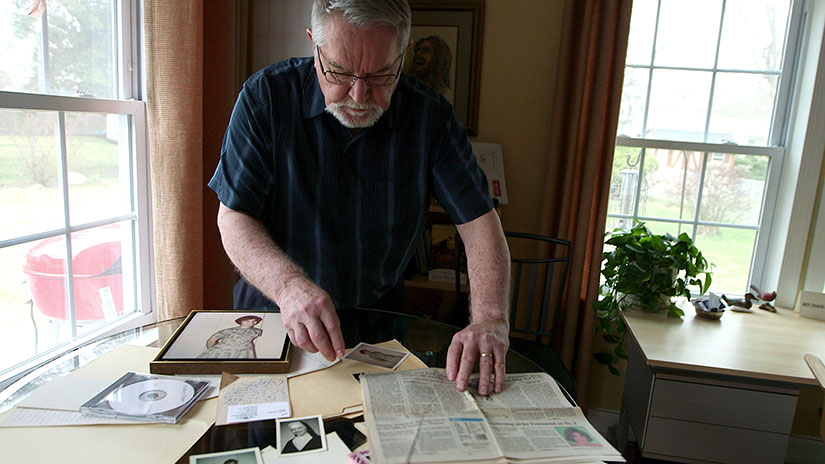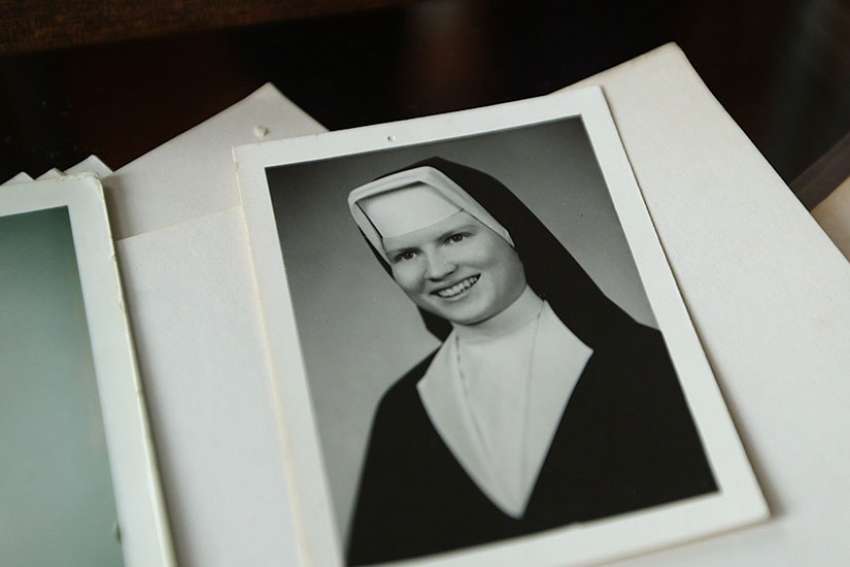This seven-part documentary is compelling, fascinating, haunting and, at times, incredibly disturbing.
It cracks open the cold case of the 1969 disappearance and murder of 26-year-old Sr. Cathy Cesnik. And it links the unsolved crime to another murder of a young woman and a web of secrets and intrigue: from a horrific ring of child sex abuse to evasive and sometimes bumbling investigators; from an allegedly demonic priest to the Church covering for him — and moving him to different parishes and schools — despite complaints from one boy’s mother and up to 100 girls with firsthand experiences.
Amazingly, there is no narrator in the documentary. Real people — players in the story — guide viewers along. The two main people are former students of Sr. Cathy who are now sleuthing grandmothers named Gemma Hoskins and Abbie Schaub, both retired and in their sixties.
They’re joined by a couple of rumpled journalists and other former students at Archbishop Keough High school, where Sr. Cathy taught English and inspired many with her joie de vivre and mothering instincts.
Hoskins and Schaub began their intrepid search for truths and justice about five years ago after starting a Facebook page in honour of Sr. Cathy. An explosion of emotion, information and leads were soon posted by former students and others who’ve been intrigued by the case for almost 50 years.
One of the people they meet through Facebook is Jean Wehner, known as “Jane Doe” in the 1994 lawsuit against Fr. Joseph A. Maskell (who died in 2001) and the Archdiocese of Baltimore. Together with another woman, known as “Jane Roe”, the two allege Maskell was the ringleader of a despicable sex ring where the priest and others — perhaps even police officers — savagely abused girls at the school.
 This is a still from the Netflix documentary series "The Keepers." As Netflix prepared to release the seven-part documentary about the unsolved 1969 murder of a Baltimore nun, officials of the Archdiocese of Baltimore reaffirmed that the church did not attempt to interfere in the investigation of the death of Sister Catherine Cesnik. (CNS photo/courtesy Netflix)
This is a still from the Netflix documentary series "The Keepers." As Netflix prepared to release the seven-part documentary about the unsolved 1969 murder of a Baltimore nun, officials of the Archdiocese of Baltimore reaffirmed that the church did not attempt to interfere in the investigation of the death of Sister Catherine Cesnik. (CNS photo/courtesy Netflix)
Their lawsuit failed after the judge ruled their “recall” of events more than 20 years earlier was invalid.
Recall or retrieval of memory is the process of re-accessing and remembering events or information from the past, which have been long suppressed and stored by the brain, usually due to traumatic events. (An interesting aside in The Keepers is the exploration of this controversial issue in psychiatry and how lawyers exploit it while cross examining witnesses.)
One of Wehner’s memories links the abuse with Sr. Cathy’s death and that gets the granny sleuths more intrigued than ever. The outgoing Hoskins hits the road and knocks on doors and interviews people while the more circumspect Schaub digs into online research channels, libraries and Freedom of Information requests for police records.
So as not to give too much away, I’ll stay away from too many specific details of the documentary, other than to say once director Ryan White and his team come on board more and more doors open for Hoskins and Schaub.
In general, it is fascinating whom White gets in front of the camera, including an aging suspect in Sr. Cathy’s murder, a couple of elderly policemen from the original case and the head of prosecutions for sex crimes when allegations against Maskell were brought to police.
The on-camera demeanour of Sharon May, who was the head of the sex crime division at the Maryland state attorney’s office in the ’90s, is strange, to say the least. At times, she sounds flippant and falls behind the veil of not having enough evidence to charge Maskell. At best, she lacks real empathy for the girls; at worst her comments suggest some sort of far-reaching cover-up.
A few off-hand remarks from Hoskins and Schaub jarred me. They said they had no idea about any of the abuse happening around them when they were at Archbishop Keough High School.
I was in high school around the time they were. I never witnessed or heard about anything like that, either, at my school, but one can’t help but wonder. There have been so many abuse scandals arise and cover-ups revealed that were not dissimilar to what occurred in Baltimore.
Critics are calling The Keepers an unsettling stunner and I concur. It’s not for everybody, with evil lurking in places one would wish for only goodness. But it’s also a reminder that good people are always out there doing good deeds and seeking truths and justice. Sadly, some — like Sr. Cathy — pay the ultimate price.
(Brehl is a writer in Port Credit, Ont., and can be reached at bob@abc2.ca, or @bbrehl on Twitter.)

